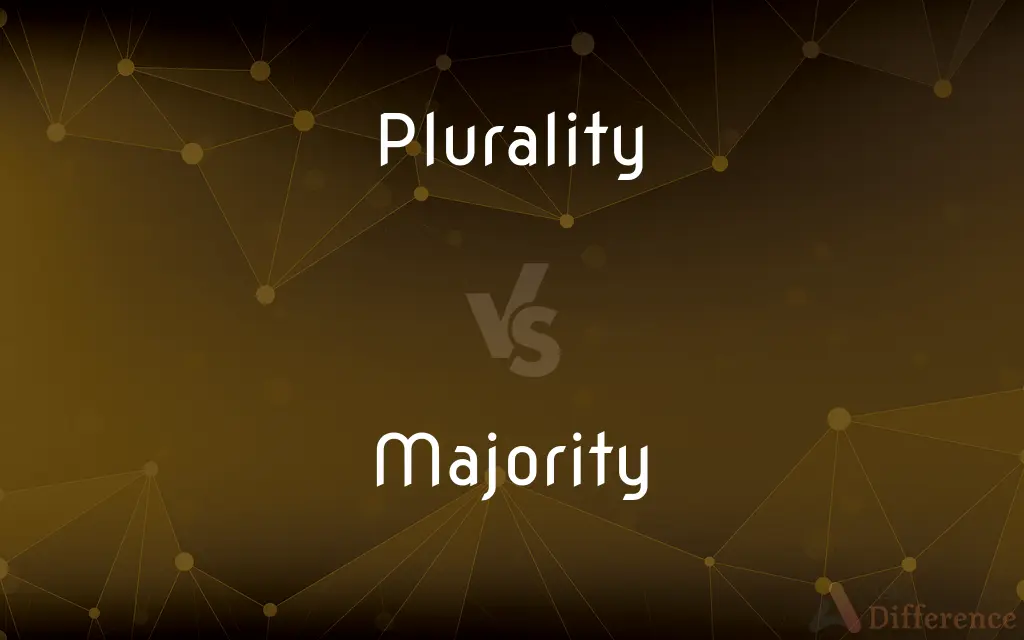Plurality vs. Majority — What's the Difference?
By Tayyaba Rehman — Updated on September 16, 2023
Plurality refers to having more than any other option but not more than all other options combined. Majority means having more than half of a total amount. While a majority is always a plurality, a plurality is not always a majority.

Difference Between Plurality and Majority
Table of Contents
ADVERTISEMENT
Key Differences
Plurality is a term often used in elections or votes to indicate that a candidate or option received more votes than any other, but not necessarily more than half of the total votes. Majority, on the other hand, refers to more than half of a certain set or group, often 50% plus one. In elections, a candidate with a majority wins outright, whereas a candidate with a plurality may not.
A plurality can sometimes be confused with a majority because they both imply a "greater number." However, a majority requires crossing a specific threshold, which is half of the total number plus one. In contrast, plurality merely means "more than any other," which could be far less than half.
Plurality is less definitive than a majority, and often additional rounds or methods are needed to reach a conclusive decision when someone or something only has a plurality. Majority is more decisive and usually conclusive in decision-making processes because it represents a consensus or at least a larger portion of the group in question.
In summary, plurality and majority are both measures of "more," but they are used in different contexts and convey different levels of decisiveness. Plurality implies the most among options but not necessarily a decisive win, while a majority indicates more than half and usually a clear decision.
Comparison Chart
Meaning
More than any other but not over half
More than half
ADVERTISEMENT
Context
Elections, Choices
General, Elections
Decisiveness
Less decisive
More decisive
Threshold
None
Over 50%
Inclusivity
Can be less than a majority
Always a plurality
Compare with Definitions
Plurality
Plurality refers to the largest group within a set but not exceeding half.
A plurality of voters are undecided.
Majority
Majority means more than half of a defined set.
The majority of students passed the exam.
Plurality
Plurality means having the most among multiple options.
She received a plurality of the votes.
Majority
Majority can also indicate the age at which one becomes legally an adult.
He will reach the age of majority next month.
Plurality
Plurality can mean a large number or multitude of something.
A plurality of reasons contributed to his decision.
Majority
Majority is used to denote a decisive win in elections.
She won by a clear majority.
Plurality
Plurality is the condition of being greater in number than any other choice.
John won the election by a plurality, not a majority.
Majority
Majority can mean the prevailing opinion or sentiment.
The majority opinion favors reform.
Plurality
Plurality is often used in contrast with majority.
Despite having a plurality, he did not have a majority.
Majority
A majority, also called a simple majority to distinguish it from similar terms (see the "Related terms" section below), is the greater part, or more than half, of the total. It is a subset of a set consisting of more than half of the set's elements.
Plurality
The state or fact of being plural.
Majority
The greater number or part; a number more than half of the total.
Plurality
A large number or amount; a multitude.
Majority
The amount by which the greater number of votes cast, as in an election, exceeds the total number of remaining votes.
Plurality
Pluralism.
Majority
The political party, group, or faction having the most power by virtue of its larger representation or electoral strength.
Plurality
The offices or benefices held by a pluralist.
Majority
(Law) The age at which a person is recognized as an adult by the law.
Plurality
In a contest of more than two choices, the number of votes cast for the winning choice if this number is not more than one half of the total votes cast.
Majority
The military rank, commission, or office of a major.
Plurality
The number by which the vote of the winning choice in such a contest exceeds that of the closest opponent.
Majority
More than half (50%) of some group.
The majority agreed that the new proposal was the best.
Those opposing the building plans were in the majority, so the building project was canceled.
Plurality
The larger or greater part.
Majority
The difference between the winning vote and the rest of the votes.
The winner with 53% had a 6% majority over the loser with 47%.
Plurality
(uncountable) The state of being plural.
Majority
(dated) Legal adulthood, age of majority.
By the time I reached my majority, I had already been around the world twice.
Plurality
(ecclesiastical) The holding of multiple benefices.
Majority
(UK) The office held by a member of the armed forces in the rank of major.
On receiving the news of his promotion, Charles Snodgrass said he was delighted to be entering his majority.
Plurality
(countable) A state of being numerous.
Majority
Ancestors; ancestry.
Plurality
(countable) A number or part of a whole which is greater than any other number or part, but not necessarily a majority.
Majority
The quality or condition of being major or greater; superiority.
Plurality
(countable) A number of votes for a single candidate or position which is greater than the number of votes gained by any other single candidate or position voted for, but which is less than a majority of valid votes cast.
Majority
The greater number; more than half; as, a majority of mankind; a majority of the votes cast.
Plurality
(countable) A margin by which a number exceeds another number, especially of votes.
Majority
Ancestors; ancestry.
Plurality
(countable) A group of many entities: a large number.
A plurality of ideas were put forth at the meeting, most of which were rejected out of hand.
Majority
The amount or number by which one aggregate exceeds all other aggregates with which it is contrasted; especially, the number by which the votes for a successful candidate exceed those for all other candidates; as, he is elected by a majority of five hundred votes. See Plurality.
Plurality
(countable) A group composed of more than one entity.
Majority
The property resulting from being or relating to the greater in number of two parts; the main part;
The majority of his customers prefer it
The bulk of the work is finished
Plurality
(of spouses) Polygamy.
Majority
(elections) more than half of the votes
Plurality
(psychology) The condition of a single body/person displaying multiple distinct personas.
Majority
The age at which a person is considered competent to manage their own affairs
Plurality
The state of being plural, or consisting of more than one; a number consisting of two or more of the same kind; as, a plurality of worlds; the plurality of a verb.
Majority
Majority refers to the greater part or number.
A majority of people prefer coffee over tea.
Plurality
The greater number; a majority; also, the greatest of several numbers; in elections, the excess of the votes given for one candidate over those given for another, or for any other, candidate. When there are more than two candidates, the one who receives the plurality of votes may have less than a majority. See Majority.
Take the plurality of the world, and they are neither wise nor good.
Plurality
See Plurality of benefices, below.
Plurality
The state of being plural;
To mark plurality, one language may add an extra syllable to the word whereas another may simply change the vowel in the existing final syllable
Plurality
A large indefinite number;
A battalion of ants
A multitude of TV antennas
A plurality of religions
Plurality
(in an election with more than 2 options) the number of votes for the candidate or party receiving the greatest number (but less that half of the votes)
Common Curiosities
What is majority?
Majority means having more than half of a total amount.
What is plurality?
Plurality means having more than any other but not more than all combined.
Is plurality used mainly in elections?
Plurality is often used in the context of elections and votes.
Does majority require over 50%?
Yes, majority means over 50%.
Can a plurality be a majority?
No, a plurality is not always a majority.
Is majority used in legal terms?
Yes, majority can refer to the legal age of adulthood.
Does plurality require over 50%?
No, plurality can be less than 50%.
Is plurality a relative term?
Yes, plurality is relative to other options or choices.
Is majority an absolute term?
Majority is more absolute as it requires surpassing a 50% threshold.
Can a majority be a plurality?
Yes, a majority is always a plurality.
How is majority determined?
Majority is determined by having more than half of a total set.
Is plurality common in multi-party systems?
Yes, plurality is more common in elections with multiple candidates or parties.
Which is more decisive, plurality or majority?
Majority is more decisive than plurality.
How is plurality determined?
Plurality is determined by having the most among multiple options.
Is majority important in decision-making?
Yes, a majority often leads to more decisive and clear outcomes.
Share Your Discovery

Previous Comparison
Superstar vs. Star
Next Comparison
Carbonate vs. BicarbonateAuthor Spotlight
Written by
Tayyaba RehmanTayyaba Rehman is a distinguished writer, currently serving as a primary contributor to askdifference.com. As a researcher in semantics and etymology, Tayyaba's passion for the complexity of languages and their distinctions has found a perfect home on the platform. Tayyaba delves into the intricacies of language, distinguishing between commonly confused words and phrases, thereby providing clarity for readers worldwide.












































